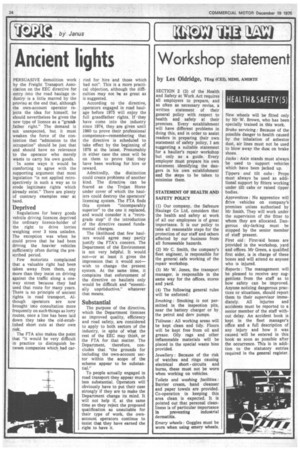Ancient lights
Page 26

If you've noticed an error in this article please click here to report it so we can fix it.
PERSUASIVE demolition work by the Freight Transport Association on the EEC directive for entry into the road haulage industry is a little marred by the :proviso at the end that, although the awn-account operator rejects the idea for himself, he should nevertheless be given the new 'type of licence as a "grand. father right." The demand is not unexpected, but it must weaken the force of the contention that "admission to the occupation" should be just that and should have no relevance to the operator who merely wants to carry his own goods.
In some ways it would he comforting to agree with the supporting argument that most • legislation "is not applied retrospectively in such a way as to erode legitimate rights which .already exist." There are plenty of contrary examples near at hand..
Deprived
• Regulations for heavy goods vehicle driving licences deprived the ordinary licence-holder of the right to drive lorries weighing over 3 tons . unladen. The exception was when he could prove that he had been driving the heavier vehicles sufficiently often during the prescribed period.
Few Motorists complained that a valuable right had been taken away from them, any more than they insist on driving against the traffic along a oneway street because they had used that route for many years. There is no principle of ancient rights in road transport, Although operators are now brought into consultation more frequently on such things as lorry routes, once a line has been laid down they take the old-established short cuts at their own risk.
The FTA also makes the point that "it would be very difficult in practice to distinguish between companies which had car
ried for hire and those which had not". This is a more practical objection, although the difficulties may not be as great as is suggested.
According to the directive, operators engaged in road haulage before 1975 will enjoy the full grandfather rights. If they have come into the industry since 1974, they are given until 1980 to prove their professional competence—remembering that the directive is scheduled to take effect by the beginning of 1978 at the latest. Presumably in either case the onus will be on them to prove that they have been working for hire or reward.
Admittedly, 'the distinction could create problems of another kind. The directive can be feared as the Trojan Horse under cover of which the hauliers could destroy the operators' licensing system. The FTA finds this system "incomparably superior" to the one it replaced, and would consider it a "retrograde step" if the introduction of the directive caused fundamental changes.
The likelihood that few hauliers would agree may partly justify the FTA's concern. The Department of the Environment is not very helpful. It would, not—or at least it gives the impression that it would not— wish to -change the present system. At the same time, it complains that enforcement of • the directive on hauliers only would be difficult and "essenti-. ally unproductive," whatever that means.
Substantial
The purpose of the directive, which the Department itemises as improved quality, efficiency and road safety, are considered to apply to both sectors of the industry, in spite of what the rest of the EEC may think, or the FTA for that matter, The Department, therefore, concludes that "the grounds for including the own-account sector within the scope of the scheme appear to be substantial."
To people actually engaged in road transport they appear much less substantial. Operators will obviously have to put their case strongly if they are to make the Department change its mind. It will not help if, at the same time as they reject the proposed qualification as unsuitable for their type of work, the ownaccount operators continue to insist that they have earned the right to have it.












































































